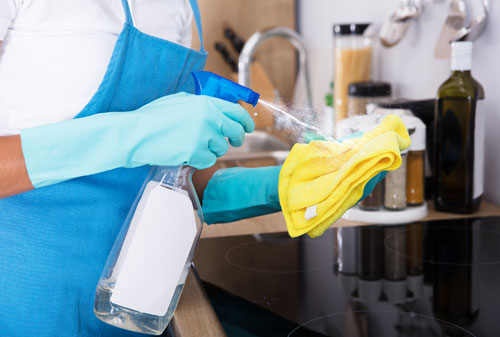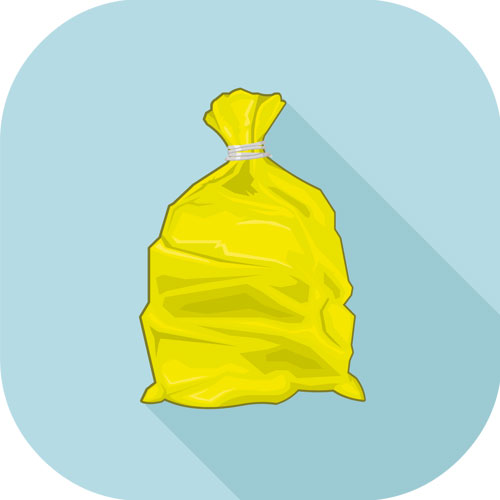




Working in a care setting will sometimes lead to using substances that could be hazardous to health, thus putting people at risk. Elderly clients may be more vulnerable to infections and to harm from spillages and other accidents.
The law requires employers to control exposure to hazardous substances in order to protect both employees and others who may be exposed. Employers need to comply with the Control of Substances Hazardous to Health (COSHH) regulations.
The Government list of hazardous substances includes:
The hazards relating to these substances can vary depending on work settings.
Under the COSHH law, managers of elderly care homes must assess the health risks to the staff, residents and visitors, and take action to prevent or control exposure to hazardous substances, infections and diseases.
Managers must establish what substances and biological hazards are present and how they can cause harm. Cleaning products, hazardous substances and soiled laundry present problems in care homes and managers must ensure the risks are minimised.
There are some cleaning products that can be replaced with safer products containing less irritants. If substitution is not possible then the potential for exposure must be reduced by ensuring there are safe systems for handling the substances, following manufacturer instructions, and by securely storing products. Cleaning products must be kept in their original containers, and the correct personal protective equipment (PPE) should be worn.
Product hazard warnings may be found on labels, which for hazardous substances may include risk phrases such as ‘avoid contact with skin’. If the information is not readily available on the label or an advisory leaflet, then managers should obtain a data sheet for that product from the supplier or manufacturer. PPE should be provided if it is not reasonably practicable to prevent or otherwise control the risk.
The PPE provided should be suitable for the product and task following the product instructions. Toilet cleaning chemicals may only require the use of rubber gloves, whereas caustic descalers and oven cleaners may require heavy-duty gloves, goggles or face shields and a well-ventilated area while the products are being used. Many of the risks for hazardous substances used in a care home can be grouped together when considering suitable control measures.
The manager must ensure that staff are given information, instruction and training on how to use and store the product safely, how to clear up spillages, and how to check and wear protective equipment correctly.
Weithiau, bydd gweithio mewn lleoliad gofal yn arwain at ddefnyddio sylweddau a allai fod yn beryglus i iechyd, gan roi pobl mewn perygl. Gall cleientiaid oedrannus fod yn fwy agored i heintiau ac i niwed oherwydd gorlifiadau a damweiniau eraill.
Mae'r gyfraith yn ei gwneud yn ofynnol i gyflogwyr reoli amlygiad i sylweddau peryglus er mwyn diogelu gweithwyr cyflogedig ac eraill a allai gael eu hamlygu. Mae angen i gyflogwyr gydymffurfio â Rheoliadau Rheoli Sylweddau Peryglus i Iechyd (COSHH).
Mae rhestr y Llywodraeth o sylweddau peryglus yn cynnwys:
Gall y peryglon sy'n gysylltiedig â'r sylweddau hyn amrywio yn dibynnu ar leoliadau gwaith.
O dan y gyfraith COSHH mae'n rhaid i reolwyr cartrefi gofal i'r henoed asesu'r risgiau iechyd i'r staff, y preswylwyr ac ymwelwyr, a chymryd camau i atal neu reoli amlygiad i sylweddau peryglus, heintiau a chlefydau.
Rhaid i reolwyr sefydlu pa sylweddau a pheryglon biolegol sy'n bresennol a sut y gallant achosi niwed. Mae cynhyrchion glanhau, sylweddau peryglus a dillad budr yn achosi problemau mewn cartrefi gofal a rhaid i reolwyr sicrhau bod y risgiau'n cael eu lleihau.
Mae rhai cynhyrchion glanhau y gellir eu disodli gyda chynhyrchion mwy diogel sy'n cynnwys llai o gyfryngau llidus. Os nad yw'n bosibl eu cyfnewid, yna rhaid lleihau'r potensial o amlygu trwy sicrhau bod systemau diogel ar gyfer trin y sylweddau, yn dilyn cyfarwyddiadau'r gwneuthurwr, a thrwy storio cynhyrchion yn ddiogel. Rhaid cadw cynhyrchion glanhau yn eu cynwysyddion gwreiddiol, a dylid gwisgo'r cyfarpar diogelu personol cywir (PPE).
Gellir dod o hyd i rybuddion am beryglon cynnyrch ar labeli, a all gynnwys ymadroddion risg fel 'dylid osgoi cyswllt â chroen' ar gyfer sylweddau peryglus. Os nad yw'r wybodaeth ar gael yn hawdd ar y label neu ar daflen gynghori, dylai rheolwyr gael dalen data ar gyfer y cynnyrch hwnnw gan y cyflenwr neu'r gwneuthurwr. Dylid darparu PPE os nad yw'n rhesymol ymarferol i atal neu reoli'r risg mewn ffordd arall.
Dylai'r PPE a ddarperir fod yn addas ar gyfer y cynnyrch a'r dasg yn dilyn cyfarwyddiadau'r cynnyrch. Efallai mai dim ond menig rwber y bydd angen eu defnyddio ar gemegau glanhau'r toiled, ond mae'n bosibl y bydd angen menig gwaith trwm, gogls neu orchudd wyneb ar gyfer glanhawyr popty, a man wedi'i awyru'n dda tra bod y cynhyrchion yn cael eu defnyddio. Gellir grwpio llawer o'r risgiau ar gyfer sylweddau peryglus a ddefnyddir mewn cartref gofal gyda'i gilydd wrth ystyried mesurau rheoli addas.
Rhaid i'r rheolwr sicrhau bod staff yn cael gwybodaeth, cyfarwyddyd a hyfforddiant ar sut i ddefnyddio a storio'r cynnyrch yn ddiogel, sut i glirio gorlifiadau, a sut i wirio a gwisgo'r cyfarpar amddiffynnol yn gywir.

Health and Social Care organisations have many hazardous substances that could cause harm to staff, service users or visitors.
Hazards in relation to substances are mostly centred on the preparation of food products and the risk from poor cleaning, unsafe handling and storage of food products.
Staff must be trained to be aware of how to handle and dispose of equipment correctly as bodily fluids and sharp objects, such as needles to administer medication, can also cause harm to people.
Mae gan sefydliadau iechyd a gofal cymdeithasol lawer o sylweddau peryglus a allai achosi niwed i staff, defnyddwyr gwasanaeth neu ymwelwyr.
Mae peryglon mewn perthynas â sylweddau yn canolbwyntio'n bennaf ar baratoi cynhyrchion bwyd a'r perygl o lanhau gwael, a thrin a storio cynhyrchion bwyd yn anniogel.
Mae'n rhaid i staff gael eu hyfforddi i fod yn ymwybodol o sut i drin a chael gwared ar gyfarpar yn gywir gan fod hylifau corfforol a gwrthrychau miniog fel nodwyddau i weini meddyginiaeth hefyd yn gallu achosi niwed i bobl.

Staff must have regular training in order to ensure they are aware of any hazardous substances in their workplace. Staff must know how to store medication and cleaning products correctly, how to dispose of waste products and protect themselves by using personal protective clothing.
Mae'n rhaid i staff gael hyfforddiant rheolaidd er mwyn sicrhau eu bod yn ymwybodol o unrhyw sylweddau peryglus yn eu gweithle. Rhaid i staff wybod sut i storio meddyginiaeth a chynhyrchion glanhau yn gywir, sut i gael gwared ar gynhyrchion gwastraff a'u hamddiffyn eu hunain drwy ddefnyddio dillad amddiffynnol personol.